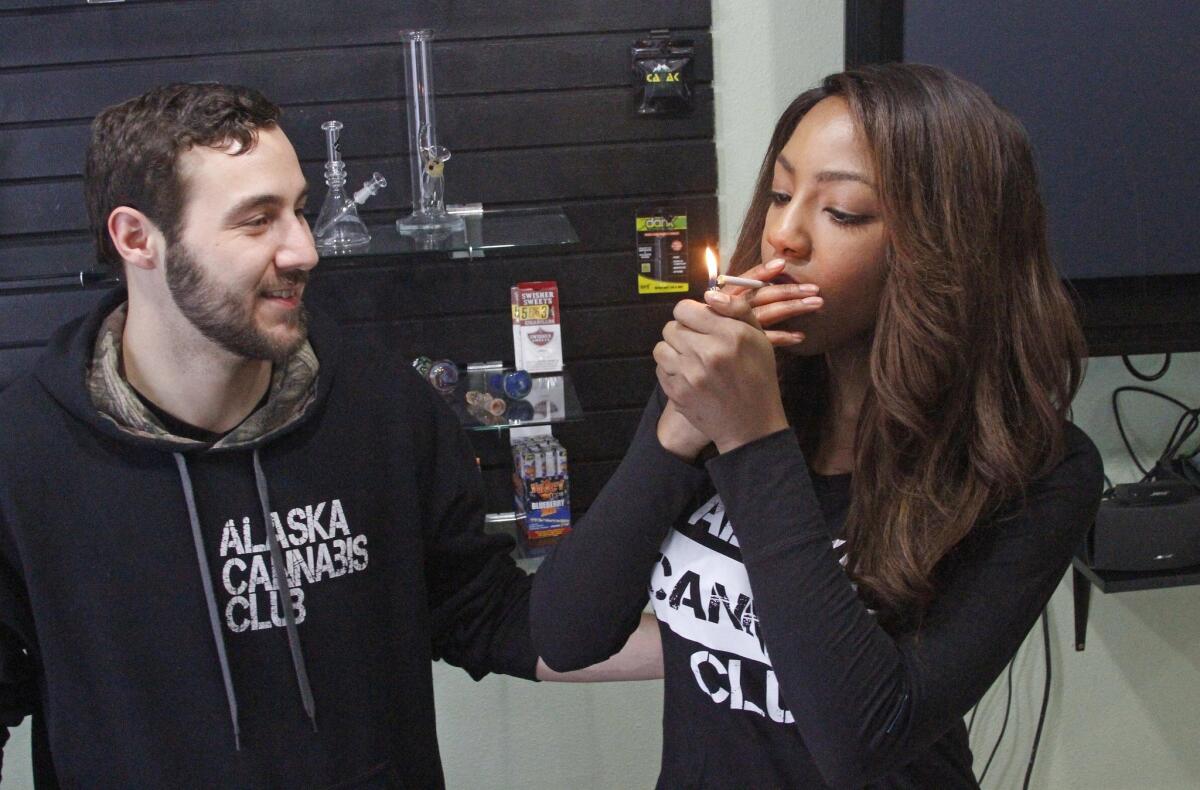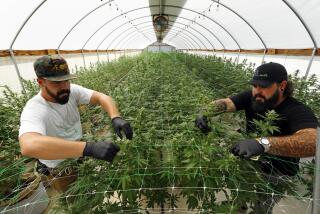Alaska becomes third state to legalize recreational marijuana use

- Share via
Reporting from Nome, Alaska — On the day Alaska became the third state in the nation to legalize recreational pot use, folks in this party town best known as the finish line for the Iditarod Trail Sled Dog Race seemed more interested in watching snowmobile contestants blast into the city than smoking a joint.
That’s largely because buying, selling and smoking marijuana in public places remains illegal. The state law that took effect Tuesday allows people 21 or older to possess 1 ounce or less of pot and grow up to six plants on private property. They can share their homegrown pot with others, but there are no retail outlets or commercial growers.
Voters in the Republican state approved legalization in a referendum last fall, 52.15% to 47.85%. But the measure did not clear up some issues related to pot regulation.
State regulators are still drafting rules covering taxation and sale of marijuana, which must be adopted by Nov. 24. Applications for the first business licenses will not be accepted until February 2016, and marijuana won’t be legal for sale until at least May 2016.
“This is a historic day, marking a legal shift,” Tim Hinterberger, chair of the Campaign to Regulate Marijuana Like Alcohol, the group that led the effort for legalization, said at a news conference.
“With great marijuana laws comes great responsibility,” he said, emphasizing that his and other advocacy groups want people to smoke responsibly. Marijuana remains illegal under federal law and driving under its influence remains a crime in Alaska.
Not everyone supports legalization. Gene Fenton, who was bagging groceries in a store, said Tuesday that he opposed the law because he worried about who would eventually profit from the new industry.
“The winners will be the pharmaceutical companies,” Fenton predicted. “They are going to control it.”
Among the basic questions left unresolved was a clear definition of a public space, where pot use is banned.
Alaska’s Alcoholic Beverage Control Board met Tuesday and unanimously passed a measure to broadly define public space to include streets, parks, schools and places where people usually meet. The board is charged with developing regulations for pot use.
Gov. Bill Walker filed legislation Monday to create a marijuana control board, similar to the body that controls alcohol sales. Creating regulations will be a major step, officials and proponents agree.
“Now that the campaign is over, it’s time to establish a robust regulatory system that sets an example for other states,” said Taylor Bickford, spokesman for the Campaign to Regulate Marijuana Like Alcohol.
Proponents maintain that a regulated, legal market would generate millions of dollars in tax revenue and create jobs. Law enforcement will be able to address serious crimes instead of enforcing failed marijuana prohibition laws, advocates say.
In January, Anchorage officials passed a city ordinance making smoking marijuana in public a violation, punishable by a $100 fine. Police in Anchorage have said they will enforce the public smoking law.
In addition to Colorado and Washington state, Oregon voters in November approved a measure similar to Alaska’s, though the drug will not become legal until July.
A ballot initiative legalizing marijuana possession but not retail sales was overwhelmingly approved in Washington, D.C.
Supporters of legalization are considering campaigns in California, Arizona, Nevada, Maine and Massachusetts.
Twitter: @latimesmuskal
Muskal reported from Los Angeles. Special correspondent Hopkins reported from Nome.
More to Read
Sign up for Essential California
The most important California stories and recommendations in your inbox every morning.
You may occasionally receive promotional content from the Los Angeles Times.











